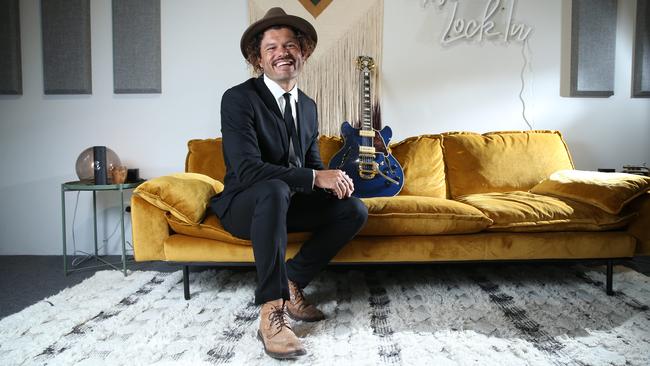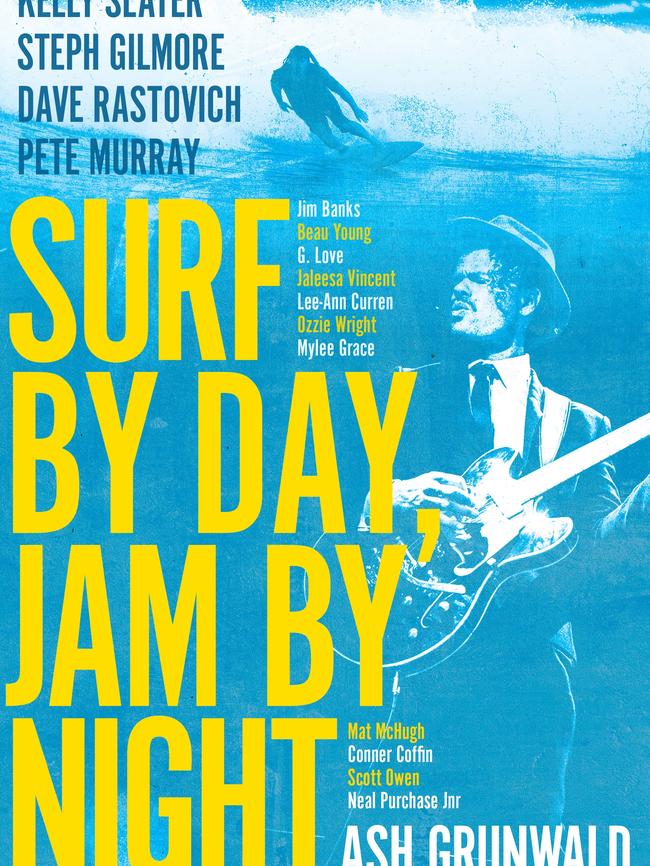Battle scars
Blues musician Ash Grunwald’s recent years have been a rollercoaster of emotions, but he’s rediscovered his mojo.

For Ash Grunwald, all it took was one tiny, three-letter word to unlock a door in his mind that he didn’t realise was closed. While living in Bali, the singer-songwriter was homeschooling his eldest daughter, Sunny, by following the Australian curriculum.
One day they started a unit on growth mindset, which got him thinking about surfing, his other passion besides music. He told his daughter the growth mindset reframes negative beliefs by adding that three-letter word. It’s not that she can’t surf; instead, it’s that she can’t surf yet.
“That ‘yet’ makes all the difference,” Grunwald tells Review while sitting in the sun on the back deck of his home in Brighton, northern NSW. “So I’m teaching her that, and I’m saying, ‘Yeah, that’s very true’ — and then I’m thinking, ‘Geez, that applies to me’.”
The musician smiles as he recalls that beautiful moment of a lesson passing between father and daughter, for its impact was significant and long-lasting. Part of the reason Grunwald moved to Bali with his wife and two daughters was that he’d lost some of the enthusiasm that had driven him for nearly 20 years, since he played the biggest concert of his nascent career at Port Fairy Folk Festival and then stood side of stage, hand-selling hundreds of copies of his early music to newly converted fans.
With no merch table or change, he and Danni — now his wife — simply stuffed cash into the pockets of their jeans while handing out CDs as quickly as they could. Afterwards, they laughed with joy while counting the haul. The money earned from that rush of Port Fairy punters ended up being worth more than the value of his car — which they’d been living out of.
After eight studio albums and three live releases, though, the gloss and novelty had worn off somewhat. Four years ago, Grunwald also went through a uniquely strange experience of elation followed by a long period of disappointment, which only recently ended with the rediscovery of his mojo. We’ll come to that.
Looking at his career through the fresh lens of a growth mindset, though, the Melbourne-born musician saw himself at a fork in the road.
“I’ve been a blues guitarist my whole career but I saw myself as a songwriter,” he says. “I thought, ‘I don’t need to be some crazy shredder on the guitar. That’s not what it’s about; it’s about songwriting’. But then, for this new phase of my career, I thought that, at my age, now it’s time for me to not be an old roots guy — it’s time for me to be a young blues guy.”

-
While that might not sound like a major distinction to the ears of the average popular music listener, it certainly is to Grunwald — not least because, at 42, he fits the criteria for being a suitably young blues performer. In the mid 2000s, though, he was a key figure in the popularisation of the roots genre in this country alongside the likes of Australian artists John Butler, Xavier Rudd and The Waifs, and US performers such as Jack Johnson and Ben Harper.
Given Grunwald’s own musical roots, it was curious that he got swept up by that particular swell, for his key influences as a young musician were blues staples such as BB King and Buddy Guy. Throughout his career to date, one of the greatest compliments that listeners can pay him is to mistake one of his own compositions for an old blues cover. “When I started, I was more about trying to make it sound old, and I’ve kind of gone back to that a bit,” he says, following an extended detour into fusing electronic elements with his own sound.
As well as a new album, his growth mindset has manifested another achievement, and it’s sitting on the wooden table between us. Named Surf By Day, Jam By Night, Grunwald has written a book that combines his two key loves of music and wave-riding by speaking with influential practitioners from both fields, including Kelly Slater, Steph Gilmore, Jack Johnson and Pete Murray.
“It was a lot harder than writing an album, that’s for sure,” he says. “The book was written from the start to the end of a midlife crisis, in a sense. I had some tough times; I had a few career setbacks, where different things I was working on just weren’t coming to fruition. In my late 30s, my head dropped a bit, and I was like, ‘Where to from here?’.”
Midway through the book, Grunwald speaks with Garrett Dutton, better known as the frontman of US alternative hip-hop band G. Love and Special Sauce. The pair bond over their shared appreciation for combining blues with hip-hop beats — a mix that was largely unexplored two decades ago, near the beginning of their respective careers.
“When I was starting and doing my first albums, blues rock was too obvious. I thought, ‘It’s been done, no need to do that again’,” Grunwald tells Dutton. “But I don’t know, now I feel like I’ve had enough of a break from it — it’s been 20 years.”
“You can come back to it with more authenticity, too, because you’ve earned it,” replies Dutton, who is four years older than his Australian friend. “Through doing something different, you’ve earned the right to go back to that root and say, ‘Okay, well now I’m marinated enough that I know what to play and what not (to play), so I can go back in and do that and now it’s real; it’s not like a kid trying to do it’.”
At the end of the G. Love chapter, Grunwald writes: “I feel a sense of joy when I think about the work ethic of being a musician for the rest of my life. As he said, we’ve earned the right to play more traditional blues now. We’re ‘marinated’. It’s so refreshing to talk to musicians who can show you the value, integrity and pride that is hard won through years on the road. In Australia in particular, maybe because our big breaks often tend to come from exposure on Triple J, which is youth radio, we tend to frown upon our older musicians just for getting older.
“Well f..k that!” he writes. “We earned our battle scars. We’ve shown resilience, hard work and talent. Why should we feel anything but proud that we’re still gigging?”
-
In 2015, while touring his album Now, Grunwald was approached by Grammy award-winning producer Brian Brinkerhoff, who loved what he heard. The American was adamant the rest of the blues world needed to hear what the Australian musician had been cooking up, too, and so he brought Grunwald to record in Los Angeles with a roll call of legendary US blues performers whose credits span five decades and much of the genre’s popular history.
“He was like a benevolent angel who hooked me up with the most miraculous thing,” recalls Grunwald. “I didn’t even pay for a coffee. I’ve never been treated like that in my life.”
After two incredible weeks of laying down tracks and watching some of his blues heroes at work playing and recording his own songs, Grunwald returned to Australia and lost contact with Brinkerhoff, who held the tapes from those sessions.
“Brian just went off the radar,” he says. “I think he had a heart attack; I don’t know. He just went missing. I tried to contact him a lot of times, and it just never worked out. I gave up, and that’s when I went to Bali.”
While continuing to play occasional shows here and overseas, Grunwald has used the past few years to recuperate, surf, homeschool Sunny and reconsider his life’s work.
That period overlaps with conducting interviews and writing Surf By Day, Jam By Night, which is aimed at readers who find themselves stuck in a rut. “It’s my hope that this book will be the philosophical spatula that gets you unstuck,” he writes on its dedication page.
Last year his manager finally tracked down the LA tapes, which he brought back to Byron Bay to re-track some guitars and vocals, while also enlisting the vocals of some fellow Australian performers such as Kasey Chambers, the Teskey Brothers and Mahalia Barnes.
The result is Mojo, a sparkling blues album that signals his artistic reinvention.
As well, on New Year’s Day last year, he and Danni made a pact to quit alcohol. The benefits of giving up booze — especially in a late-night industry where that substance is used and abused with abandon — for 19 months and counting have been remarkable.
The Living End bassist Scott Owen and his partner, Clare, joined the couple in the pact. “When I first met him, he was the same as me; he wouldn’t think about going on stage or picking up his instrument without loosening up with a few beers beforehand — and during,” says Owen, who recorded and toured with Grunwald for the 2013 album Gargantua.
“The music was just one of the tools for having fun, getting loose and being as drunk as the audience.
“Whereas now, Ash has taken his instrument a hell of a lot more seriously, by learning some techniques,” says the bassist. “He’s been committing to practising for hours per day, with a really high discipline. His skills have gone through the roof. It’s wonderful, and I’ve seen how much joy it’s brought to him — but he must be really proud of himself as well.”
In 2008 Grunwald released a song named The Bottle, which appeared on Fish Out of Water. At Review’s request, he sings a few bars while playing an unplugged electric guitar in a storage room inside his house, which he has designs on turning into a home studio. “And I know about the f..king difference between pleasure and happiness,” he sings and strums, “Until the bottle run out, I’m gonna take what I can get.”
Yet a decade ago, he wasn’t quite ready to listen to his own advice. In the introduction of his book, Grunwald writes: “They go together, for sure, but as I mature, I’m beginning to suspect that their relationship to one another is a little more complicated than I initially assumed … We humans tends to normalise pleasure, eventually rendering it hollow, unlike happiness. It’s a penny that takes a little longer to drop for the more hedonistic among us.”
With a book of meaningful conversations with high-achieving professionals under his belt, and a swag of songs that were rescued from the 2015 recording sessions he thought were lost forever, Grunwald is charging into the next phase of his career as a young blues guy with a clear head and a beaming smile.
The work he has put into improving his lead guitar work has paid off, too: the weekend before Review visits his home, he played a festival show with his band. His family were there, too, and they noticed the way in which he now has the confidence and ability to take tasteful, speedy solos in sections where he’d previously stick to playing rhythm.
After he got off stage and Sunny — who is now nine, and has a four-year-old sister, Aria — commented on how his playing has grown, he reminded her of the concept they learned together in Bali. It’s not that he couldn’t play lead guitar like some of those old blues guys; it’s that he couldn’t play lead guitar like them yet.
Mojo is released on Friday via Bloodlines.
Surf By Day, Jam By Nightis out now via Pantera Press.
Ash Grunwald’s national tour begins in Adelaide (October 4) and ends at the Queenscliff Music Festival (November 23).



